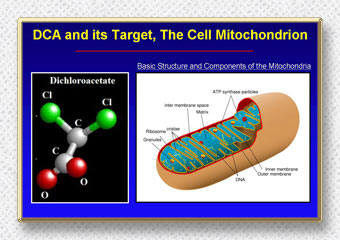-
Please
return first
page

It sounds almost too good to be true: a cheap and simple drug that kills almost all cancers by switching off their “immortality”. The drug, dichloroacetate (DCA), has already been used for years to treat rare metabolic disorders and so is known to be relatively safe.
It also has no patent, meaning it could be manufactured for a fraction of the cost of newly developed drugs.
Evangelos Michelakis of the University of Alberta in Edmonton, Canada, and his colleagues tested DCA on human cells cultured outside the body and found that it killed lung, breast and brain cancer cells, but not healthy cells. Tumours in rats deliberately infected with human cancer also shrank drastically when they were fed DCA-laced water for several weeks.
DCA attacks a unique feature of cancer cells: the fact that they make their energy throughout the main body of the cell, rather than in distinct organelles called mitochondria. This process, called glycolysis, is inefficient and uses up vast amounts of sugar.
Until now it had been assumed that cancer cells used glycolysis because their mitochondria were irreparably damaged. However, Michelakis’s experiments prove this is not the case, because DCA reawakened the mitochondria in cancer cells. The cells then withered and died (Cancer Cell,
Michelakis suggests that the switch to glycolysis as an energy source occurs when cells in the middle of an abnormal but benign lump don’t get enough oxygen for their mitochondria to work properly (see diagram). In order to survive, they switch off their mitochondria and start producing energy through glycolysis.
Crucially, though, mitochondria do another job in cells: they activate apoptosis, the process by which abnormal cells self-destruct. When cells switch mitochondria off, they become “immortal”, outliving other cells in the tumour and so becoming dominant. Once reawakened by DCA, mitochondria reactivate apoptosis and order the abnormal cells to die.
“The results are intriguing because they point to a critical role that mitochondria play:
they impart a unique trait to cancer cells that can be exploited for cancer therapy,”
DCA can cause pain, numbness and gait disturbances in some patients, but this may be a price worth paying if it turns out to be effective against all cancers. The pay-off is that if DCA does work, it will be easy to manufacture and dirt cheap.
Suarez tested C-reactive protein (CRP) blood levels in 121 healthy, nonsmoking men and women between 18 and 65 years of age. On the same day, he also measured each participant's level of anger, hostility and depression using a series of standard psychological tests. He found that - in the absence of heart disease risk factors such as smoking, obesity and high blood pressure - high levels of these negative emotional states "significantly predicted the blood level of CRP." Those who were prone to anger, hostility or depression had two to three times higher CRP levels than their more mellow peers, the researchers said.
In the meantime, people concerned about their heart health might want to just "cool it" when tempers flare. "It's very important to pay attention to how we can change these behaviours," Suarez said. "I know it isn't easy, though."
"It's difficult to change patterns of behaviour that are intrinsic to who we are as individuals, so it's not going to be an overnight thing," he added. "But we can start by saying, 'What gets me angry?' and 'If I get angry, do I start to feel depressed and withdrawn from my social network?' " Also, take a stress break. "If a walk around the park can calm you down, do it," Suarez said.